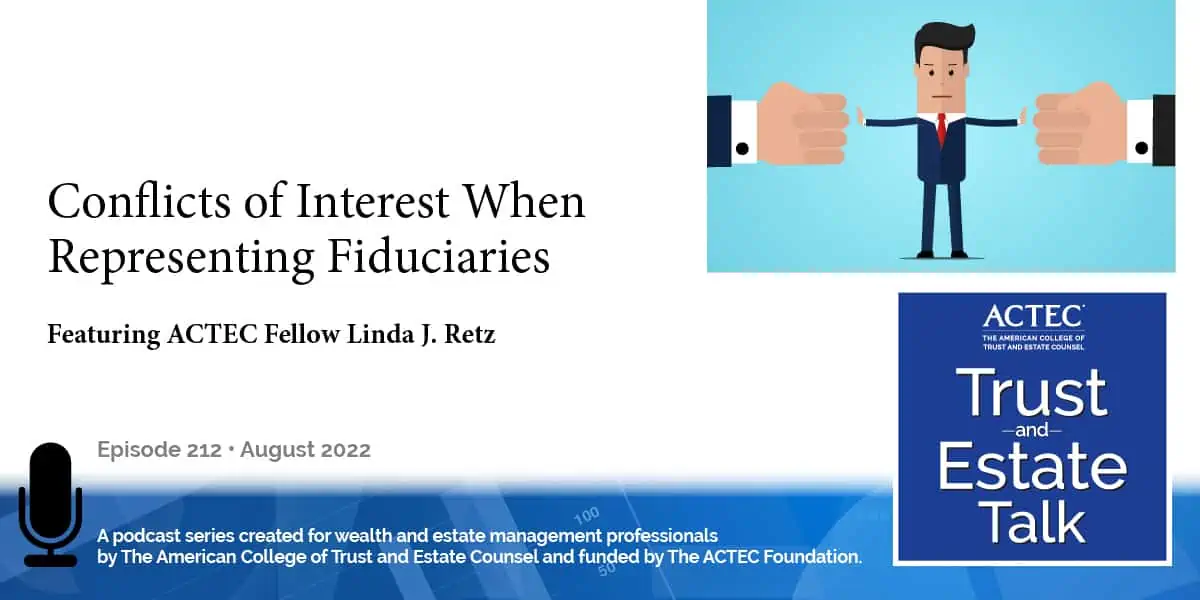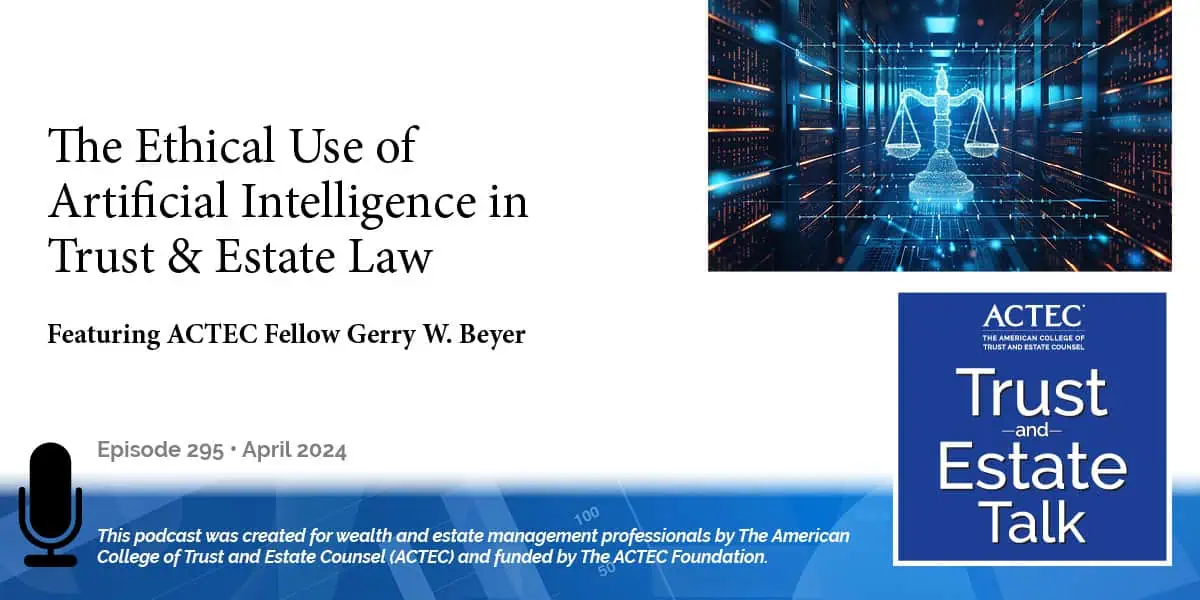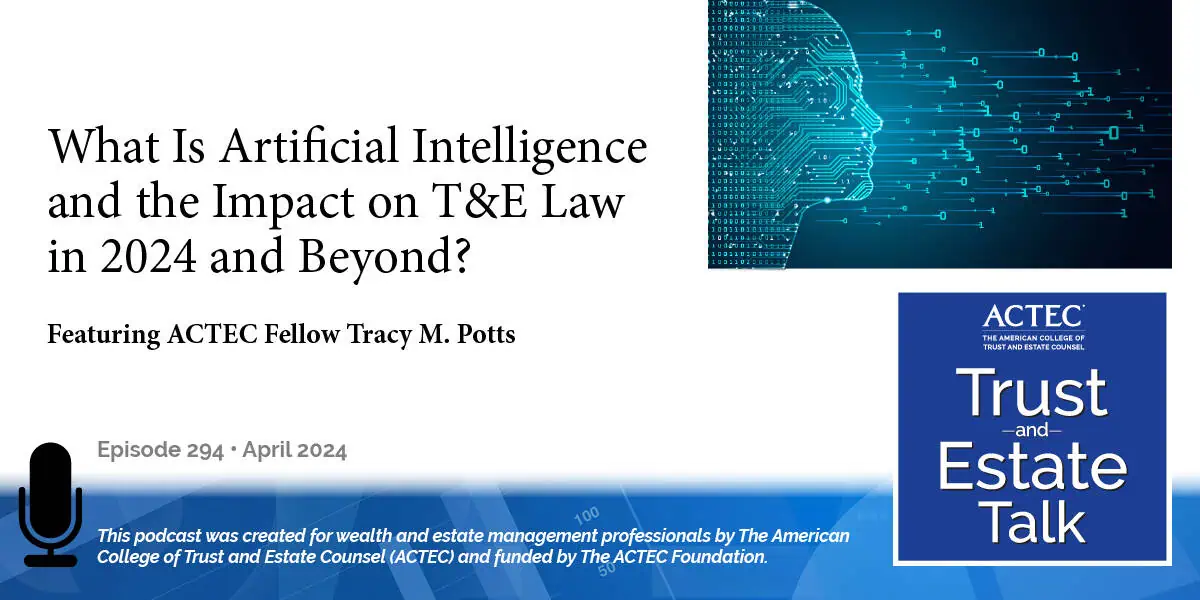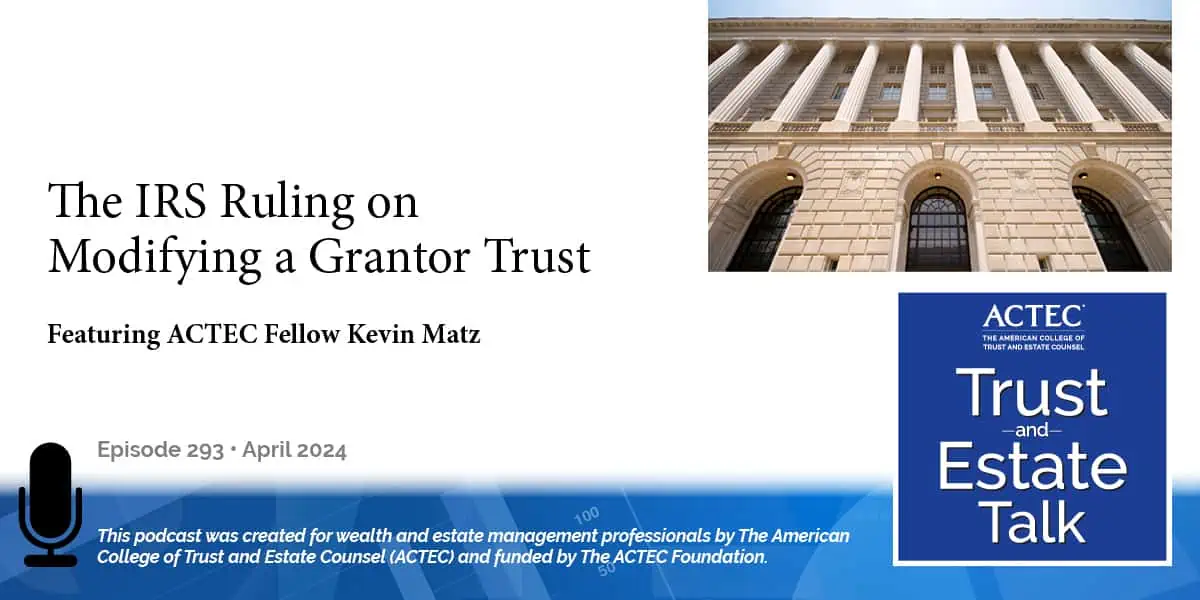Conflicts of Interest When Representing Fiduciaries

“Conflicts of Interest in Representing Fiduciaries,” that’s the subject of today’s ACTEC Trust and Estate Talk.
Transcript/Show Notes
This is Stacy Singer, ACTEC Fellow from Chicago, Illinois. It’s critical to understand the potential conflicts of interest that can arise in representing fiduciaries. ACTEC Fellow Linda Retz from Torrance, California will offer tips regarding these conflicts. Welcome, Linda.
Thank you, Stacy. Today, I’ll provide my tips by reference to the ABA Model Rules of Professional Conduct. Bear in mind, of course, that it’s important to consult the rules that apply in your own jurisdiction. So, let’s look first at representing co-trustees of a trust. I find in my practice that it is easier for me to unearth potential conflict with multiple trustees that I’m contemplating representing if I have a separate, private conversation with each of them in advance. After all, just because technically you can represent multiple clients under the rules, it doesn’t mean you should.
Conflict of Interest Example 1: Succession
Take, for example, the situation where a husband dies and wife and a corporate fiduciary are named to serve as co-trustees of a trust, where the surviving spouse has a life estate and the remainder passes to the children of the husband’s prior marriage. The corporate trustee may be more mindful of its fiduciary responsibilities, and in particular, of the need to preserve principal for the children of his prior marriage. Whereas the spouse may want more liberal distributions made to her than those permitted by the trust terms.
Model Rule 1.7 concerning the representation of concurrent clients says that a lawyer cannot represent one client if there’s a significant risk that the lawyer’s responsibilities will be materially limited by duties to the other client(s). So, in the hypothetical I just gave you, it may be difficult, if not impossible, to effectively carry out your duties to both clients.
Next, looking at the representation of successor fiduciaries. So, for example, let’s say a decedent’s friend or a professional serves as trustee for many years and then decides to retire, and now you’re asked to represent the successor fiduciary. Now, Model Rule 1.9 comes into play about duties to former clients. Rule 1.9 says I can’t represent a predecessor trustee and a current trustee in a substantially related matter if the interests of the current client are materially adverse to the interests of the former client. But there is an exception, and that is that the former client can provide informed written consent to the representation of the successor trustee. But what if, during the course of representing the successor trustee, you discover that a breach of trust was committed by the predecessor trustee? I would say it’s pretty hard to protect your successor trustee client without throwing the predecessor trustee under the bus.
So, in California, when we obtained informed, written consent of predecessor trustees to representing successors, or of any former client, to the representation of a new individual we have to not only inform them of the potential conflicts, but we have to provide examples. So, in California, when I prepare such a consent for a former client’s signature, I specifically point out that if a predecessor trustee has committed a breach of trust what can occur, so that the consent is truly informed. Now, what if the predecessor trustee doesn’t resign, but is removed and the lawyer wants to continue to represent that individual as an heir or a beneficiary?
Conflict of Interest Example 2: Duty of Care
Well, there’s an interesting Illinois case from 2018 called the Estate of Hudson v. Tibble. And, in that case, there were two heirs – the decedent’s wife and his son by a prior marriage. The decedent’s wife had served as the administrator of the estate, but was accused by the son of dissipating estate assets, withholding assets to which the son thought he was entitled, and attempting to destroy records related to that malfeasance. There was a settlement reached whereby the wife agreed to resign as administrator, and an independent administrator was appointed to serve in her place.
When the wife stepped down, the law firm decided that it wanted to continue to represent her individually as an heir. The firm was sued both by the successor administrator and the decedent’s son for a breach of fiduciary duty and legal malpractice, and the suit was based on its representation of the wife both as a fiduciary and individually as an heir. The firm filed a motion for summary judgment, saying that there was no attorney-client relationship between the firm and the estate. Since the decedent’s wife was the firm’s client, the firm alleged that it owed no duty to the estate.
The trial court went for that and granted the firm’s motion for summary judgment, but it was reversed on appeal. The Appellate Court of Illinois said, and I quote, “Given that the relationship between an administrator and a beneficiary is fiduciary in character and the primary duties of the administrator are to collect and pay debts and distribute any remaining assets to a decedent’s heirs, it perplexes this court how any attorney retained to assist in that purpose would not correspondingly owe a duty of care to that estate.”
Conflict of Interest Example 3: Prospective Clients
Finally, what about our duties to prospective clients? Model Rule 1.18(b) says that “even when no attorney-client relationship ensues, a lawyer who has information from a prospective client cannot use or reveal that information, except as Rule 1.9 would allow us to do with respect to former clients.” And, once again, this played out in an interesting way in a New York Committee on Professional Ethics opinion. The number is 1126 and it’s from 2017. In this ethics opinion, the lawyer had represented both husband and wife jointly in drafting their revocable trust.
The wife died and the trust directed that her share of the trust assets was to be placed in trust for her husband for life with the remainder passing, at the husband’s death, to the wife’s children from a prior marriage, of course. The husband consulted the lawyer about his duties as trustee after the wife died, so the lawyer just assumed they were being carried out. But then, after the husband died, his sister contacted the lawyer and told the lawyer that the husband didn’t fund the wife’s trust. Instead, he placed all assets, his and hers, in the husband’s name for the benefit of his sister, which effectively disinherited the wife’s children by a prior marriage.
So, the lawyer asked the Committee on Professional Ethics whether he could inform the wife’s children of the breach of trust. The Committee decided that he could not, saying that the sister had become a prospective client when she consulted the lawyer about the mere possibility of forming a lawyer-client relationship and went on to say that even if the husband’s actions were criminal in nature, they would constitute a past crime, not a present crime anticipated by one of the exceptions to the rule of confidentiality under Rule 1.6. So, there you have it. Beware of conflicts in the interest in the course of representing fiduciaries. And, remember that just because technically you can represent multiple fiduciaries or someone in both a fiduciary and individual capacity, that doesn’t mean you should. Thank you.
Thank you, Linda, for helping us understand these complex conflicts of interest in representing fiduciaries. That was really wonderful.
You may also be interested in:
The ACTEC Commentaries on the Model Rules of Professional Conduct continues ACTEC’s tradition of providing guidance particular to estate and trust practitioners. The Fifth Edition update to the Commentaries takes account of amendments to the Model Rules adopted since the 2005 Fourth Edition, including those proposed by the American Bar Association Commission on Ethics 20/20 as adopted by the ABA in 2012 and 2013.
This podcast was produced by The American College of Trust and Estate Counsel, ACTEC. Listeners, including professionals, should under no circumstances rely upon this information as a substitute for their own research or for obtaining specific legal or tax advice from their own counsel. The material in this podcast is for information purposes only and is not intended to and should not be treated as legal advice or tax advice. The views expressed are those of speakers as of the date noted and not necessarily those of ACTEC or any speaker’s employer or firm. The information, opinions, and recommendations presented in this Podcast are for general information only and any reliance on the information provided in this Podcast is done at your own risk. The entire contents and design of this Podcast, are the property of ACTEC, or used by ACTEC with permission, and are protected under U.S. and international copyright and trademark laws. Except as otherwise provided herein, users of this Podcast may save and use information contained in the Podcast only for personal or other non-commercial, educational purposes. No other use, including, without limitation, reproduction, retransmission or editing, of this Podcast may be made without the prior written permission of The American College of Trust and Estate Counsel.
If you have ideas for a future ACTEC Trust & Estate Talk topic, please contact us at ACTECpodcast@ACTEC.org.
© 2018 – 2024 The American College of Trust and Estate Counsel. All rights reserved.
Latest ACTEC Trust and Estate Talk Podcasts

The Ethical Use of Artificial Intelligence in Trust & Estate Law
A law professor offers insights into the risks, rewards, duties and ethical considerations of lawyers using AI in their T&E practices.

What Is Artificial Intelligence and the Impact on T&E Law in 2024 and Beyond?
A primer on the types and uses of AI, then a deeper dive into the impact on trust and estate law from types to applications to ethical considerations.

The IRS Ruling on Modifying a Grantor Trust
Explore the gift tax implications for trust beneficiaries modifying grantor trusts in IRS CCA 202352018, with nuanced analysis and estate planning insights.

